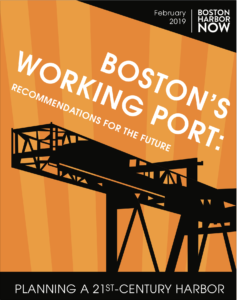The 2018 report Innovation in Boston’s Working Port: Planning a 21 st -Century Harbor set the stage for an overdue discussion of Boston Harbor’s working waterfront and the significance of its contribution to the city and the region’s economy and way of life. In early 2018, Boston Harbor Now convened national and local experts to discuss the working waterfront issues highlighted in the report and explore solutions employed by other national and international port cities.
Our year-long research revealed that there is a large body of academic literature on ports. However, literature that specifically deals with and responds to the challenges of an evolving working waterfront and its relationship to cities is still rare. The second installment of Innovation in Boston’s Working Port focuses on developing recommendations that respond to the needs of Boston’s working waterfront and the four themes that emerged from our discussions with stakeholders, industry experts, advocates, and city and state officials: Growth, Flexibility, Synergy, and Change.
Our goal is to deliver an ideas document that, when implemented, can respond to the challenges our working waterfront is facing. Forty-years after the establishment of the Office of Coastal Zone Management and the subsequent creation of Designated Port Areas, it is imperative that we reevaluate this framework and ensure that our policies and plans accurately reflect our priorities and continue to preserve and promote our water-dependent maritime industrial uses.
The release of the City of Boston’s Resilient Boston Harbor plan highlights the importance of implementing resilient projects along Boston Harbor from the Neponset River to the Mystic River to the Belle Isle Marsh. The plan offers a vision for a resilient, accessible, and well-prepared waterfront. As a significant contributor to the economic health of our harbor, the working port must also prioritize executing a vision and implementing solutions that ensure the industrial waterfront is resilient in the face of rising seas.
DOWNLOAD THE FULL RECOMMENDATIONS REPORT HERE (updated 3/6/19)


Comments